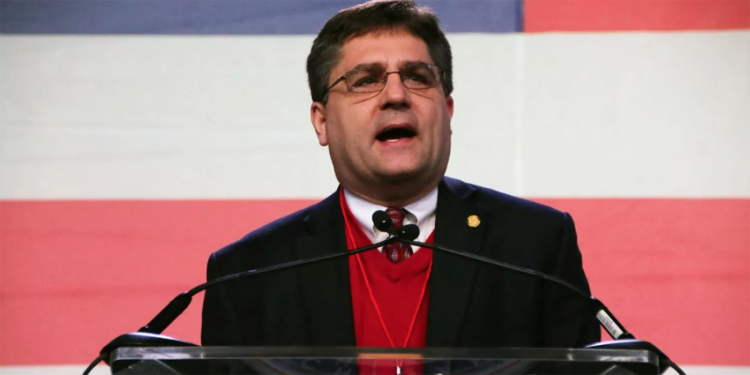Former MI Senator Files Perjury Criminal Complaint Against Dominion Voting Machines CEO

In the heart of every true American patriot beats the drum of integrity, especially when it comes to the sanctity of our elections. It’s a non-negotiable cornerstone of our democracy, and when that’s threatened, it’s not just a cause for concern—it’s a call to action.
Former Michigan Senator Patrick Colbeck has taken up that call with a fervor that resonates deeply with those who hold the MAGA values close.
Colbeck has filed a perjury criminal complaint against John Poulos, CEO of Dominion Voting Systems, alleging that Poulos made false statements during his testimony before the Michigan Senate Oversight Committee on December 15, 2020.
Trending: Michael Avenatti Says He is Willing to Testify on Behalf of Donald Trump in Hush Money Case
This move is not just about holding one man accountable; it’s about standing up for the principles that ensure every American voice is heard loud and clear at the ballot box.
The complaint centers around Poulos’ claims regarding the internet connectivity of voting machines. Colbeck asserts that contrary to Poulos’ testimony, these machines were indeed connected to the internet during the election—a point which could have significant implications for election security.
The former senator isn’t alone in his concerns; many conservatives have been vocal about potential vulnerabilities in our voting systems and are demanding transparency and accountability.
This isn’t just idle chatter or conspiracy theorizing; there are tangible pieces of evidence being brought forward. For instance, Colbeck points to a report by Allied Security Operations Group which suggests that Dominion Voting Systems are “intentionally and purposefully designed with inherent errors to create systemic fraud and influence election results.”
These are strong words backed by what many in conservative circles believe to be solid investigative work.
The implications here go beyond technicalities—they strike at the heart of public trust in our electoral process. If people can’t believe their votes are counted as cast, then what do we have left? It’s this very question that fuels movements like MAGA and drives individuals like Patrick Colbeck to take bold action.
Moreover, this isn’t an isolated incident or concern. Across various states, similar worries have been voiced about election integrity. In Arizona, for example, an audit was conducted in Maricopa County due to persistent concerns from Republican lawmakers about irregularities in the 2020 election process.
What makes this situation particularly compelling is how it ties into broader narratives cherished by Trump supporters—narratives about fighting back against what they see as a system rigged against them. It’s not just about one election; it’s about ensuring every future election is free from manipulation or doubt.
It’s important to note that these actions aren’t without their critics. Detractors argue that claims like those made by Colbeck have been debunked and dismissed by courts across the country.
Yet for many conservatives, these rebuttals fail to address their underlying unease—a feeling that something fundamental might be amiss.
As we delve deeper into this issue, we find ourselves entangled in a web of technology and testimony where truth seems elusive but all-important. The details matter here: server connections, access logs, chain-of-custody records—all pieces of a puzzle that Americans deserve to see completed transparently.
In essence, what we’re witnessing is more than just legal complaints or political maneuvers; it’s an embodiment of a larger struggle for truth and assurance within our democratic institutions—a struggle many Trump supporters feel is crucial as America looks toward future elections.
As this story unfolds further—and undoubtedly it will—eyes will remain fixed on how these allegations play out both legally and in the court of public opinion. Will they lead to changes in how we handle our elections? Will they restore confidence among those who feel disenfranchised? These questions hang heavy over America’s political landscape as patriots like Patrick Colbeck continue their pursuit for answers grounded not just in belief but also in verifiable facts.
And so we watch closely as each new development adds another layer to our understanding—or perhaps deepens the mystery—of what truly happened behind those electronic screens on Election Day 2020.

